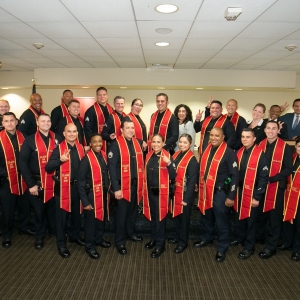LAPD Officers Focus on Building Trust with Vulnerable Populations Through USC Training Program
March 20, 2019 / by Matthew Kredell- Practice
Jonathan Grube noticed a problem in his everyday dealings with community members as an officer for the Los Angeles Police Department. Due to recent changes in national immigration policies, undocumented immigrants and their families were afraid that any interaction with him would result in deportation.
Through his participation in the Law Enforcement Advanced Development (LEAD) program – a partnership between the LAPD, USC Sol Price School of Public Policy and USC Suzanne Dworak-Peck School of Social Work – Grube identified a possible solution that may even be considered for implementation in the department.
Grube determined that the root of the issue is that many Los Angeles residents believe the LAPD works with U.S. Immigrations and Customs Enforcement. As a result, data collected by the LAPD shows a decrease in the percentage of crime reported by Latinos, who comprise the largest portion of the city’s population.
With support from fellow classmates and instructors from USC on his capstone project, which he and the other participants presented to command staff Feb. 27 at the Los Angeles Police Academy, Grube formed a plan of action.
The LAPD had recently published an official document titled “Federal Immigration Enforcement and the LAPD” meant to ease the minds of undocumented immigrants, but the intended audience wasn’t just going to search out the 20-page document online. Grube proposed condensing the document to the size of a small pamphlet so that patrol officers and detectives can distribute the information directly, reassuring people that the LAPD is adamant in its stance to support undocumented immigrants along with all residents of Los Angeles.
Grube won the award for best capstone project on March 1 at USC, when he was among 26 LAPD officers to receive a certificate for completion of the second cohort of LEAD. The program aims to educate officers on community policing, in order to build trust and legitimacy, while enhancing their understanding of vulnerable populations, and reducing the need to use force.
Pannell noted that the idea of last year’s best capstone winner, Officer Cecilia Frausto, to send Youth Service Officers out of the Community Relations Office to follow up on domestic violence calls where juveniles were present was turned into a pilot program.
Officers took part in the hybrid online-classroom program on their own time, around busy work schedules. As a response to feedback in the first cohort, USC added more class time, monthly rather than twice a semester, to provide officers with more in-person interaction with each other and their instructors.
“Officers all see something different that could be worked on, but we’re busy with our lives and busy with our jobs – we work long hours – so having this program gave us the opportunity to pump the breaks and create space and time to put effort into these issues that we see and want to address,” said Officer Jennifer Smith, whose capstone was on educating juveniles on potential negative effects of marijuana use. “I’m really excited to see my project come to fruition. It’s just about getting command staff to hear your ideas, and this program gave us the opportunity to do that.”
LEAD provides the tools, resources and skills for officers to address important problems they care about. Lt. Shawn Gregory, the LAPD liaison for LEAD, said it took him 20 years on the force to learn how to access some of the resources that officers are being introduced to in this program.
“Given that many of the students are junior officers, the level of understanding of community resources they showed in their presentations was really impressive,” Gregory said. “And that’s a result of this program putting them in touch with experts outside of the department. We have other leadership programs, but they are usually more about teaching management of personnel and supervision. This is really about teaching officers to be leaders in their community and coordinate efforts with outside organizations and community groups in order to address crime and quality of life issues – and that’s what community policing is.”
In the third cohort, which has already started, the program is moving fully under the care of USC Price and the Safe Communities Institute (SCI).
Republished from USC Price.
To reference the work of our faculty online, we ask that you directly quote their work where possible and attribute it to "FACULTY NAME, a professor in the USC Suzanne Dworak-Peck School of Social Work” (LINK: https://dworakpeck.usc.edu)
